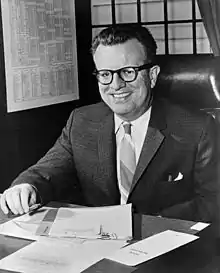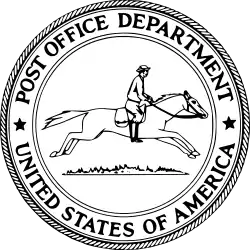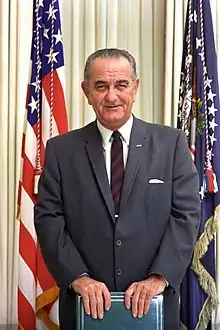Larry O'Brien
Lawrence Francis O'Brien Jr. (July 7, 1917 – September 28, 1990) was an American politician and basketball commissioner. He was one of the United States Democratic Party's leading electoral strategists for more than two decades. He served as Postmaster General in the cabinet of President Lyndon Johnson and chair of the Democratic National Committee. He also served as commissioner of the National Basketball Association from 1975 to 1984. The NBA Championship Trophy is named after him.
Larry O'Brien | |
|---|---|
 | |
| 3rd Commissioner of the NBA | |
| In office June 1, 1975 – February 1, 1984 | |
| Preceded by | J. Walter Kennedy |
| Succeeded by | David Stern |
| Chair of the Democratic National Committee | |
| In office March 5, 1970 – July 14, 1972 | |
| Preceded by | Fred R. Harris |
| Succeeded by | Jean Westwood |
| In office August 30, 1968 – January 14, 1969 | |
| Preceded by | John Moran Bailey |
| Succeeded by | Fred R. Harris |
| 57th United States Postmaster General | |
| In office November 3, 1965 – April 10, 1968 | |
| President | Lyndon B. Johnson |
| Preceded by | John A. Gronouski |
| Succeeded by | W. Marvin Watson |
| Personal details | |
| Born | Lawrence Francis O'Brien Jr. July 7, 1917 Springfield, Massachusetts, U.S. |
| Died | September 28, 1990 (aged 73) New York City, U.S. |
| Political party | Democratic |
| Spouse(s) | Elva Brassard (m. 1945) |
| Children | 1 |
| Education | Northeastern University (LLB) |
O'Brien, son of Irish immigrants, was born in Springfield, Massachusetts. When he was not working in politics, O'Brien managed his family's real estate and worked in public relations.
Early life and politics
O'Brien was born on July 7, 1917, in Springfield, Massachusetts. He learned about politics at a young age. His father, a local leader of the Democratic Party, recruited him at 11 years old to serve locally as a volunteer in the 1928 presidential campaign of Al Smith. O'Brien became a passionate Democrat. He earned a bachelor's degree in law in 1942 at the Northeastern University – Springfield Division, now known as the Western New England University School of Law. O'Brien was married to the former Elva Brassard in 1945. They had one son, Lawrence F. O'Brien III, who became a lobbyist.
He was appointed in 1946, 1948, and 1950 by his friend Foster Furcolo to serve locally as the director of the U.S. House of Representatives election campaigns. O'Brien was appointed in 1952 by John F. Kennedy to serve in Massachusetts as the director of his successful U.S. Senate election campaign and, in 1958, to serve in Massachusetts as the director of his successful reelection campaign. Kennedy's elections were largely attributed to O'Brien's recruitment, his use of volunteers, and his development of a statewide election campaign.
In 1959, he built the foundation for Kennedy's 1960 presidential campaign by touring the United States. O'Brien was appointed in 1960 by Kennedy to serve nationally as the director of his presidential campaign. His election planning in key primary states such as Wisconsin and West Virginia convinced many in the party that Kennedy's Catholicism was not a problem.
O'Brien developed a new presidential party. He collected information about each convention delegate and alternate delegate, and communicated frequently with each delegate's liaisons. O'Brien was appointed in 1964 by President Lyndon B. Johnson to serve nationally as the director of his presidential campaign. In 1968, O'Brien served as one of Senator Robert F. Kennedy's presidential campaign advisors. After Kennedy was assassinated, Vice President Hubert Humphrey appointed O'Brien to serve nationally as the director of his presidential campaign and by Howard Hughes to serve in Washington as his public-policy lobbyist.
Committed to the principle that political parties are fundamental to the American political process, O'Brien was elected in 1968 and in 1970 by the DNC to serve as its national chairman. John H. Meier, a former business advisor to Hughes, collaborated with Humphrey and others to use Donald Nixon to feed misinformation to his brother, the President.
According to Meier, he told Donald that he was sure the Democrats would win the election since they had a lot of information on Richard Nixon's illicit dealings with Howard Hughes that had never been released, and that O'Brien had the information.[1] (O'Brien didn't actually have any documents, but Meier wanted Richard Nixon to think he did.) Donald then called his brother and told him that Meier gave the Democrats all the Hughes information that could destroy him (Richard Nixon) and that O'Brien had it.[2]
During the 1972 presidential election, O'Brien was the top advisor to George McGovern. During the Thomas Eagleton affair, his name was mentioned as the possible vice presidential replacement. This position later went to Sargent Shriver.
On June 17, 1972, O'Brien's office in the Watergate complex was broken into during the Watergate scandal that followed, which ultimately led to the resignation of President Nixon.
The DNC Lawrence O'Brien Award was created in 1992 by his family and the Democratic Party leaders to acknowledge the many years of service he gave to the party and his belief in the importance of volunteer contribution.
Government
His first post in Washington was in 1948 as Rep. Foster Furcolo's administrative assistant. In 1960, he was appointed by President-elect Kennedy to recruit staff for his administration. O'Brien was appointed in 1961 by President Kennedy to serve in Washington as the special assistant to the president for congressional relations and personnel. O'Brien was also responsible for awarding patronage. O'Brien was a member of President Kennedy's inner circle of trusted advisers, known in Washington as the "Irish Mafia".
He lobbied successfully during President Kennedy's first year for the expansion of the U.S. House of Representatives Standing Committee on rules to ensure a liberal and moderate majority. O'Brien also lobbied for increasing the minimum wage. He managed President Kennedy's activities in 1962 on the behalf of the Democratic Party during its election campaigns.
O'Brien accompanied President Kennedy and Jackie Kennedy on their trip to Texas in November 1963 and was riding in the car immediately behind the president's in Dallas. As such he was an eye witness to the assassination of President Kennedy. After the president was declared dead, O'Brien accompanied the coffin and Jackie Kennedy back to Air Force One at Love Field in Dallas. While aboard Air Force One, President Johnson called for O'Brien and Kenny O'Donnell, another Kennedy insider and member of the "Irish Mafia", asking both of them to stay on and work with him in the new administration. Although O'Brien had never been close to Johnson (and many writers, including Johnson biographer Robert Caro, reported that O'Brien did not like or trust Johnson and/or had openly made fun of Johnson), he remained at the White House and worked for the new President. President Johnson appointed O'Brien to serve as special assistant to the president for congressional relations and personnel. O'Brien continued this service through 1965.
O'Brien was appointed in 1965 by President Johnson to serve in Washington, D.C., as the U.S. Postmaster General. O'Brien continued this service through 1968. During his tenure as Postmaster General, in September 1967, the Post Office Department cancelled many "mail by rail" contracts, electing to move First Class mail via air and road transport.[3] This had a devastating effect on passenger train revenues and led directly to the ending of many passenger rail routes across the United States, which had relied on carrying mail to supplement their income as early as the 1830s (see: Railway post office).
The U.S. National Archives and Records Administration Lawrence F. O'Brien Gallery was named and opened in 2004 in his memory.
NBA commissioner
O'Brien was appointed in 1975 by the National Basketball Association as its commissioner until 1984. He went on to successfully direct the ABA–NBA merger and negotiate television-broadcast agreements with CBS Television while seeing game attendance significantly increase. After retirement, in honor of his service to the sport, the NBA Championship Trophy was renamed as the Larry O'Brien NBA Championship Trophy.
However, his league was troubled by public relations issues, especially after the merger. The NBA was looked down on by many fans and reporters, who believed that most NBA players used illegal drugs as well as other racial stereotypes. O'Brien pushed for an anti-drug agreement with the NBA Players Association in order to appease people and clear up this image, which was later reached successfully.
O'Brien also pushed for the league to move its TV contract from ABC to CBS; in the aftermath of this, ABC Sports chief Roone Arledge decimated CBS's NBA ratings via counter-programming. CBS later used a new contract to move around, show on tape-delayed coverage (most famously Game 6 of the 1980 NBA Finals), or simply ignore NBA postseason games.
O'Brien was also generally pushed by his staff into many of his good decisions, including the expanded All-Star Weekend, most notably by his successor NBA David Stern. Many consider Stern the driving force behind expanded (and non-haphazard) TV contracts with CBS and cable networks and the rise in game attendance, as well as several crucial issues that predicated the rise of the NBA in the early 1980s.[4]
O'Brien was inducted into the Naismith Memorial Basketball Hall of Fame, located at his birthplace, Springfield, Massachusetts.
NBA career highlights
- League expanded from 18 to 23 teams[5]
- Coordinated the NBA's richest TV contract to date (1982)
- Brought the NBA to cable television (ESPN and USA) in 1982, establishing the league as a pioneer of cable TV
- Negotiated two landmark collective bargaining agreements (1976, 1983)[5]
- Modified the college draft and restored peace to a league in the midst of legal turmoil (1976)
- Negotiated the ABA–NBA merger as the Denver Nuggets, San Antonio Spurs, Indiana Pacers, and New York Nets joined the league and the Kentucky Colonels and Spirits of St. Louis were bought out and Virginia Squires folded[5]
- Introduced salary cap (1983)
- Orchestrated the 1976 settlement of the Oscar Robertson suit, creating a fair and equitable system of free agency for veterans
- Annual NBA attendance reached 10 million during his tenure
- Gate receipts doubled and television revenue tripled during his time as commissioner[5]
- Established NBA College Scholarship program (1980)
- Reached a stringent anti-drug agreement with the NBA Players Association (1983)[5]
- Oversaw the adoption of the three-point field goal in the NBA (1979)[5]
Quotations
- "Volunteers are essential to the success of any political campaign. There is no such thing as having a surplus of volunteers", O'Brien, 1960 campaign manual of President Kennedy.
- "I'm proud to be a politician. Politics is the art of the possible and it is an intensely personal art", O'Brien memoirs, No Final Victories.
Death
O'Brien died of cancer after surgery in Manhattan, New York, on September 28, 1990, at the age of 73, and was interred in St. Michaels Cemetery in Springfield, Massachusetts.
References
- DuBois, Larry, and Laurence Gonzales (September 1976).Hughes Nixon and the C.I.A.: The Watergate Conspiracy Woodward and Bernstein Missed.Playboy.
- Bellett, Gerald (1995). Age of Secrets: The Conspiracy that Toppled Richard Nixon and the Hidden Death of Howard Hughes. Voyageur North America. ISBN 0-921842-42-2
- RailsWest Railroad Museum - A Teacher's Guide to "A Railway Mail Service"
- Halberstam, David (1999). Playing for Keeps: Michael Jordan and the World he Made. Random House. ISBN 978-0-7679-0444-5.
- Hubbard, Jan (November 10, 1983). "NBA lawyer likely to succeed O'Brien". The Dallas Morning News. p. 6B.
External links
- Oral History Interviews with Lawrence O'Brien, from the Lyndon Baines Johnson Library
- Appearances on C-SPAN
| Political offices | ||
|---|---|---|
| Preceded by John A. Gronouski |
United States Postmaster General 1965–1968 |
Succeeded by W. Marvin Watson |
| Party political offices | ||
| Preceded by John Bailey |
Chair of the Democratic National Committee 1968–1969 |
Succeeded by Fred R. Harris |
| Preceded by Fred R. Harris |
Chair of the Democratic National Committee 1970–1972 |
Succeeded by Jean Westwood |

